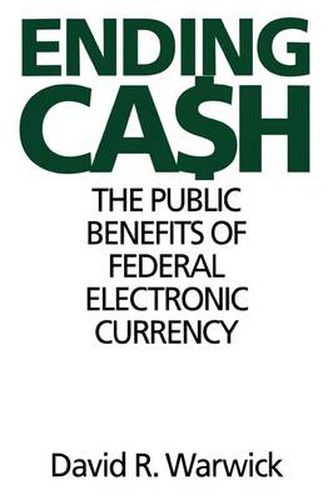Readings Newsletter
Become a Readings Member to make your shopping experience even easier.
Sign in or sign up for free!
You’re not far away from qualifying for FREE standard shipping within Australia
You’ve qualified for FREE standard shipping within Australia
The cart is loading…






Ending Cash argues that America’s tangible cash shuld be transformed into a new federal electronic currency (FEDEC). Although Warwick admits that private bank card systems and/or the Internet may some day supplant cash, he explains why this will not happen soon, certainly not in our lifetime. Warwick emphasizes that the unrealized benefits of cashlessness far exceed the mere convenience that citizens generally look for and enjoy in bank card usage. While stressing the relative inefficiency of cash, said to run $60 billion a year just in handling costs, he illustrates the profound role cash plays in most crimes, including tax evasin, all of which could be prevented witha resultant public savings in the hundreds of billions of dollars each year if a federal system were created. Against the backround of consumer-oriented EFT systems, including credit-, debit-, and smartcard systems, Warwick explains the disinterest of industry in achieving cashlessness, as well as its organizational incapacity to carry it out. He thus argues the need for government involvement. Among the many facets he covers are privacy, security, technical requirements, and operational costs. He also explains the issue of employing private currencies as a replacement for cash, and how fedral e-currency might impact the banking and bank card industries.
$9.00 standard shipping within Australia
FREE standard shipping within Australia for orders over $100.00
Express & International shipping calculated at checkout
Ending Cash argues that America’s tangible cash shuld be transformed into a new federal electronic currency (FEDEC). Although Warwick admits that private bank card systems and/or the Internet may some day supplant cash, he explains why this will not happen soon, certainly not in our lifetime. Warwick emphasizes that the unrealized benefits of cashlessness far exceed the mere convenience that citizens generally look for and enjoy in bank card usage. While stressing the relative inefficiency of cash, said to run $60 billion a year just in handling costs, he illustrates the profound role cash plays in most crimes, including tax evasin, all of which could be prevented witha resultant public savings in the hundreds of billions of dollars each year if a federal system were created. Against the backround of consumer-oriented EFT systems, including credit-, debit-, and smartcard systems, Warwick explains the disinterest of industry in achieving cashlessness, as well as its organizational incapacity to carry it out. He thus argues the need for government involvement. Among the many facets he covers are privacy, security, technical requirements, and operational costs. He also explains the issue of employing private currencies as a replacement for cash, and how fedral e-currency might impact the banking and bank card industries.